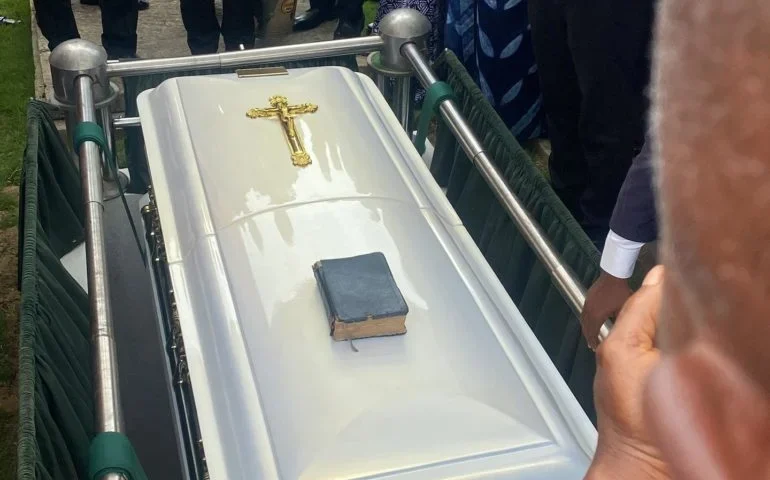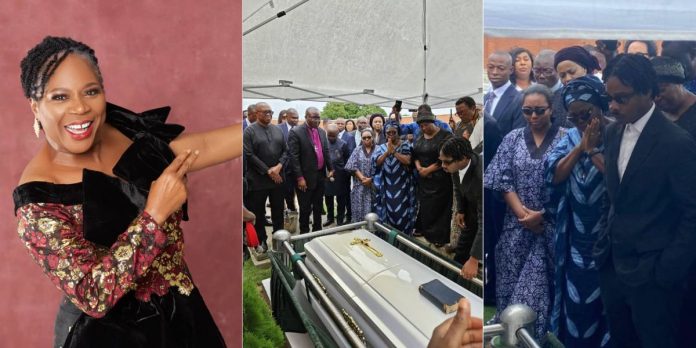By Chris Agbedo
Onyeka Onwenu, a woman whose voice resonated beyond the realms of music and entertainment, was a formidable force in Nigerian society. Her life was a testament to resilience, courage, and an unwavering commitment to justice, particularly for the Igbo people, who have long suffered under the weight of systemic marginalization and oppression in Nigeria. The narrative of Onyeka’s life, especially in her final days, is steeped in irony, a stark reminder of the unpredictable and often cruel nature of life, which dealt her its final blow just as she was at the height of her advocacy.
Onyeka Onwenu’s anger towards the Nigerian state was not born out of mere sentimentality but from a deep-seated sense of injustice and betrayal. At the ‘50 Years after Nigeria-Biafra War’ Conference, her words were a powerful indictment of the Nigerian state, which she believed had never truly ended the civil war for the Igbo people. For Onyeka, the wounds of the war, which claimed millions of lives, had not healed; instead, they festered, exacerbated by the state’s continued neglect and the persistent marginalization of Ndigbo.
She recounted personal stories of loss and suffering, including the heartbreaking tale of her family home in Port Harcourt, which was seized after the war, the renaming of D K Onwenu Road, Port Harcourt, and her mother, who was beaten into a coma simply because she was Igbo. These experiences, emblematic of the broader Igbo plight, fueled her anger and her relentless fight against the injustices meted out to her people. Onyeka’s lamentations highlighted a painful truth: that the Nigerian state had failed to acknowledge or atone for the atrocities committed against Ndigbo, leaving a legacy of unresolved grievances and deep-seated resentment.
Her angst was not limited to the government; she also expressed frustration with her fellow Ndigbo, urging them to stop waiting for external validation or assistance. Her call to action was clear: Ndigbo must take their destiny into their own hands, as they had done in the past, and continue to build their communities and protect their interests without relying on a state that had repeatedly failed them.
Onyeka Onwenu was not alone in her lamentations. Her sentiments were echoed by other prominent Igbo leaders, most notably Chief John Nnia Nwodo, the former President General of Ohanaeze Ndigbo Worldwide. During a live broadcast organized by BBC Igbo on Biafra Remembrance Day, Nwodo lent his voice to the growing discontent within the Igbo community. He articulated the same grievances that Onyeka had passionately expressed: the unresolved issues that led to the Nigerian civil war and the ongoing marginalization of Ndigbo. Nwodo’s reflections on the war and its aftermath underscored a crucial point: the Nigerian government had failed to preserve the history of the war or commemorate the millions who died. Unlike other nations that have endured civil wars, Nigeria has made no concerted effort to reconcile with the past or acknowledge the suffering of the Igbo people. There is no national day of remembrance for the war, no cenotaphs honouring the dead, only a persistent erasure of a painful history that continues to haunt the present.
This failure, Nwodo argued, has left a vacuum that groups like IPOB have exploited, fueling renewed calls for Biafra and a sense of alienation among the Igbo. His words reinforced Onyeka’s message: until the Nigerian government addresses these deep-seated grievances, the ghosts of Biafra will continue to loom over the Nigerian state, and the anger and resentment within the Igbo community will not subside.
The plight of Ndigbo in contemporary Nigeria extends beyond historical grievances. At every turn, the Igbo people are subjected to harassment, taunting, and even outright hostility. The most recent example of this is the #IgboMustGo campaign propagated by Lagospedia, a social media blog notorious for spewing hate speech against Ndigbo. This campaign, which gained traction in Lagos, a city with a significant Igbo population, is emblematic of the broader anti-Igbo sentiment that pervades Nigerian society. The #IgboMustGo campaign is not an isolated incident but part of a larger pattern of discrimination and violence that Ndigbo have faced across Nigeria.

From the aftermath of the civil war, where Igbo properties were seized, to the persistent stereotyping and exclusion from key national affairs, the Igbo experience in Nigeria has been one of systemic oppression. The campaign in Lagos is particularly poignant because it occurs in a city that the Igbo have helped build and where they have made significant contributions to the economy and culture. Onyeka Onwenu’s anger and frustration are deeply tied to these ongoing injustices. She saw in the #IgboMustGo campaign a continuation of the same bigotry and hatred that had fueled the civil war and that continues to marginalize her people. Her words at the conference were a defiant response to these forces: Ndigbo would not bow or be silenced; they would continue to assert their rights and dignity in a country that has often treated them as second-class citizens.
The irony of Onyeka Onwenu’s life is perhaps most starkly illustrated by the events leading up to her death. After delivering her impassioned speech at the “50 Years After Nigeria-Biafra War” Conference, Onyeka seemed to be at the peak of her advocacy. Her performance at the 80th birthday celebration of Emzor pharmaceutical mogul Stella Chinyelu Okoli on 30th July 2024, was a testament to her enduring talent and spirit. But life, in its often cruel and unpredictable way, had other plans. Shortly after her spectacular performance, Onyeka Onwenu passed away. The timing of her death, coming on the heels of such a powerful articulation of her struggles and hopes for Nigeria, adds a tragic dimension to her legacy. It is as if Life, playing its final farce, allowed her one last moment in the spotlight before delivering its fatal blow. Her passing is a profound loss, not just to the Igbo community but to Nigeria as a whole. Onyeka Onwenu’s life and death encapsulate the struggles of Ndigbo in Nigeria, a people who have given so much to the nation, only to be met with indifference, hostility, and, at times, outright hatred. Her anger, her defiance, and her unwavering commitment to justice are a reflection of the broader Igbo experience. Even in death, Onyeka remains a symbol of resilience, a voice that continues to echo in the hearts of those who share her vision of a more just and equitable Nigeria.
In conclusion, Onyeka Onwenu’s life was a testament to the power of art, advocacy, and unwavering commitment to one’s people. Her anger at the injustices faced by Ndigbo, her defiant stance against a system that sought to marginalize her, and her tragic yet ironically timed death all contribute to a legacy that will endure long after her passing. Her life and words serve as a rallying cry for all who seek justice and equality in Nigeria. Even in death, Onyeka Onwenu remains a beacon of hope and a powerful reminder that the fight for justice is a noble and necessary endeavour. As we remember Onyeka Onwenu, we must also carry forward her legacy by continuing to fight for a Nigeria where every citizen, regardless of ethnicity, can live with dignity and respect. Her voice may be silenced, but her message will continue to inspire generations to come. In the farce called Life, Onyeka played her part with grace, courage, and unwavering resolve. Now, it is up to us to ensure that her legacy endures and that her vision of a more just and equitable Nigeria becomes a reality.
Fare thee well, Onyeka Onwenu, the Elegant Stallion, the Nigerian Robin, the Igbo Nightingale, the Canary, and the Song Thrush of our time, a voice that transcended the ordinary and spoke directly to the soul. Your songs may have been silenced, but your legacy will continue to resonate in the hearts of those who dare to dream of a better world. The farce called Life may have played its final trick, but your legacy endures. Adieu, the Elegant Stallion! Adieu!
- AGBEDO is a Public Affairs Analysts and writes from Enugu





